Fake news: A spot of bother in journalism
"Young people are the most affected by fake news and propaganda."
JOURNALISM
By Joseph Kizza
@joekizza
__________________________
KAMPALA - When celebrated Ugandan entertainer Anne Kansiime last month woke up from a siesta to find more than 150 missed calls on her phone, she immediately knew something was amiss. The comedienne, actress and TV host would soon find out that during her brief shuteye, news had spread that she had drowned together with her boyfriend in Canada.
"I am alive, I am well, I am in love, I am so happy. And for all the ninjas that love celebrating my life, you knew where I was because you follow me," a characteristically beaming Kansiime dismissed the claims in a short selfie video.
In the five-minute footage posted on her YouTube page, the self-styled ‘Queen Ninja' was also keen to offer a dollop of advice to her social media followers in the hope that they do not fall into the jaws of such misleading hoaxes.
"Please follow the right pages. I recently got a blue tick on Instagram [meaning the account is verified]. I have a blue tick on Facebook and I have one YouTube page, so no excuses."
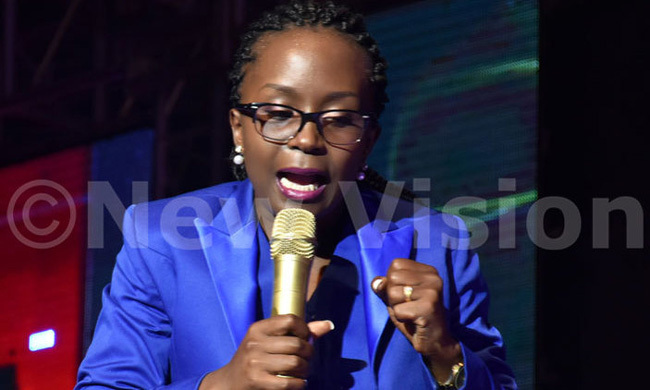 Comedienne Anne Kansiime came out to dispel fake news that she had died. (File photo)
Comedienne Anne Kansiime came out to dispel fake news that she had died. (File photo)
The Kansiime false death story is one of thousands - or even millions - other similar hoaxes that have slalomed their way into the public space all over the world. Fake news, it is. And according to veteran journalist Barbara Among, we must call a spade a spade. No sugar-coating.
"We may want to sanitize the word ('fake'), but it is what it is: fake," she said Thursday in Kampala during a vibrant discussion on practising journalism in times of disinformation.
"Fake news always relates to what is happening in society," she weighed in further, underlining that this wave of and appetite for disinformation peaks towards election time, with especially politicians taking advantage of it to "influence our election narrative".
Citizens' Coalition for Electoral Democracy in Uganda (CCEDU) co-ordinator Crispin Kaheru shared the same sentiments.
"The political heat is already on ahead of the 2021 general elections, and along with that comes the intensity of fake news. Fake news will pick up in the coming months," he told media practitioners and other key stakeholders during the dialogue organized by Media Focus on Africa, a non-profit organisation.
Ugandans will go to the polls in under two years from today to elect their new set of leaders. The Electoral Commission, led by Justice Simon Byabakama Mugenyi, has since launched the strategic plan and roadmap to the polls.
Meanwhile, the Commission has warned political actors against engaging in early campaigning before the nomination exercise is officially announced.
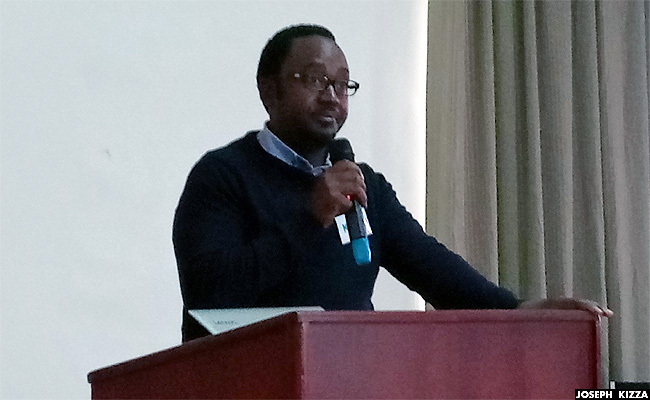 Kaheru projects that fake news will pick up in the coming months
Kaheru projects that fake news will pick up in the coming months
‘Invest in journalistic vigilance'
In 2013, a Global Risks Report by the World Economic Forum warned that "digital wildfires" could spread false information rapidly. The report also presented the concern that "our hyperconnected world" could facilitate the "rapid viral spread of information that is either intentionally or unintentionally misleading or provocative, with serious consequences".
"Fake news is the new way to kill people. It is the new way to blackmail people and it a new tool to manipulate people. Politicians will use this tool," said Kaheru, also posing a critical question: How much are media organisations investing in the fact-checking of information?
"The challenge is quite enormous, but it is very clear. As journalists, we need to invest in journalistic vigilance."
Failure to do so leaves a trail of consequences, as UNESCO's Daniel Kaweesi highlighted: "Fake news and untruths and everything related to it is making people suffer. These days, it is very easy to see a human being accused of stealing a chicken dead while the chicken is still alive."
To Kaweesi, it is also a question of morals.
"A lot must be done to make sure we go back to normality. In the event of fake news, to me, journalism is under attack. We need to instill morals in our society so that they get back to telling the truth."
During Thursday's discussion, a couple of arguments bubbled to the fore. One participant said that journalists have sold the profession cheaply to politicians. Another observation was that race to being the first to publish is leading journalists to fall prey to disinformation.
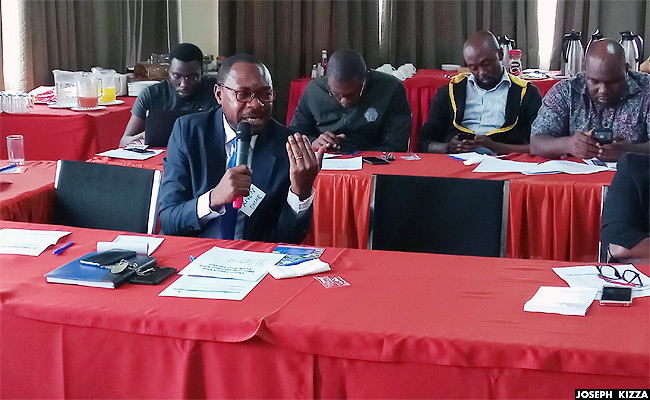
So how are media houses battling fake news?
In his discourse, journalist Herbert Benon Oluka explained that fact-checking and social media verification is being done to counter disinformation and misinformation. It is understood that media establishments are also using investigative journalism as well as online tools to generate the right information for their audiences.
"Fake news can make a media house lose its credibility," he warned.
If media can get their houses in order and also retain their best and most experienced journalists, it could help counter the huge wave of fake news, Oluka argued.
Seasoned journalists Carol Beyanga, Edris Kiggundu and Giles Muhame were also at the heart of the discussion, offering their experiences in the profession. It turned out that often, it is a double-edged sword.
As a consequence of disinformation, "we have had to restrain ourselves in order to verify information. But sometimes, we have burnt our fingers", according to Beyanga, who is an editor at Daily Monitor. "We are more cautious when it comes to politics. We have learnt that you would rather be safe than sorry."
It is a learning curve, explained Kiggundu, who works with online platform Nile Post.
"We have been victims of fake news. We have been fooled before. Because of fake news, you become cautious," he said, pointing out that traditional print media have the edge over online platforms because of the various layers of editing their content goes through before publication.
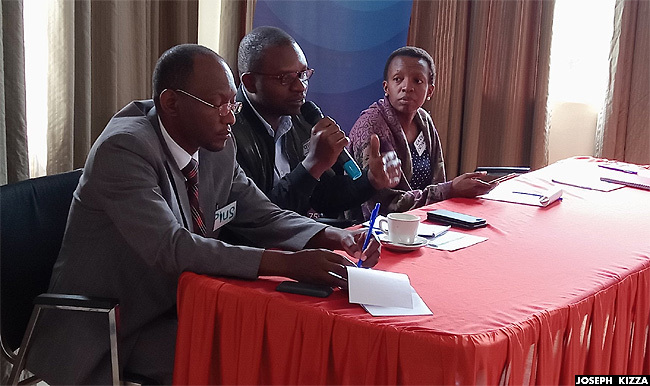 Giles Muhame says media have to diversify for more independence
Giles Muhame says media have to diversify for more independence
On his part, ChimpReports' managing editor Muhame encouraged fellow journalists to get better acquainted with the subjects they cover. "Sometimes, you run fake news out of ignorance. We need to expand the horizons of our knowledge."
He also voiced the need for media houses to think about diversification in order to steer away from advertising as a chief source of revenue. "Personally, I think the biggest threat to media independence are the advertisers. Sometimes, we are victims of blackmail."
And if you thought fake news is packing up, think again.
"Fake news is not about to go away," warned Pius Mwinganisa, the Media Council secretary, who called for a change of attitudes among journalists. He argued that information should also be better managed, organized and archived.
Mwinganisa, who also works in the ICT ministry, also called for the registration of online media publications as well as for more training of practitioners.
"Self-regulation is important."
Media Focus on Africa will facilitate the Uganda Media Week 2019, which is due later this year. The event will bring together different stakeholders to deliberate on the various challenges facing the media today.
In the buildup to that important week, Media Focus on Africa is hosting a series of dialogues on key topical issues. The idea is that the the discussions will put the challenges into context, discuss the various issues that arise and seek workable solutions to address them.
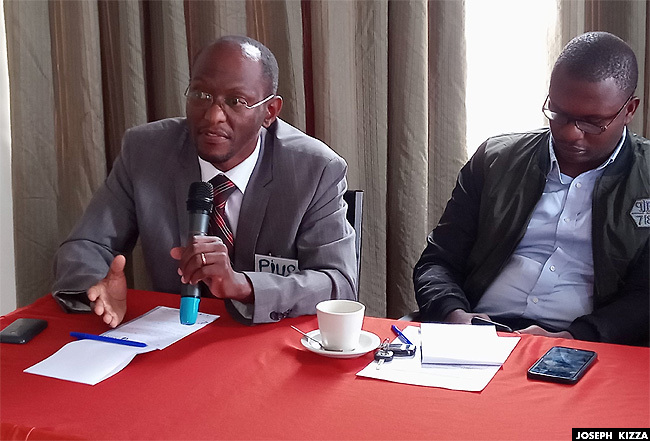 Pius Mwinganisa says media houses need to be more organised
Pius Mwinganisa says media houses need to be more organised
WHAT OTHERS SAID
Dr. Emily Maractho -- Uganda Christian University:
Fake news is not exactly new. It is the way we are using it that makes it appear new. I would like to view fake news as intentional.
There is a very big decline in the trust of the elite. Somehow, it is like the elite are driving their own agenda. There is increasing pressure on fact-based media. Fake news creates a lot of confusion. There is distrust of news as a subject.
We need to rethink the role of media. Journalists need to go beyond the traditional roles of the media (informing, educating and entertaining) and put into context the news or information they generate.
Abbas Mpindi -- Media Challenge Initiative:
For the first time ever, journalists have begun to matter. Fake news is a wakeup call to promote transparency among journalists.
Young people are the most affected by fake news and propaganda. In most cases, young people focus on the content and not the source. This calls for empowerment of this group through media literacy campaigns.
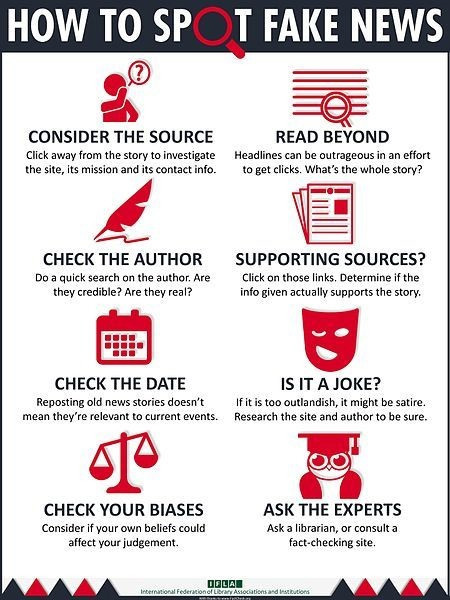 (Image credit: IFLA)
(Image credit: IFLA)